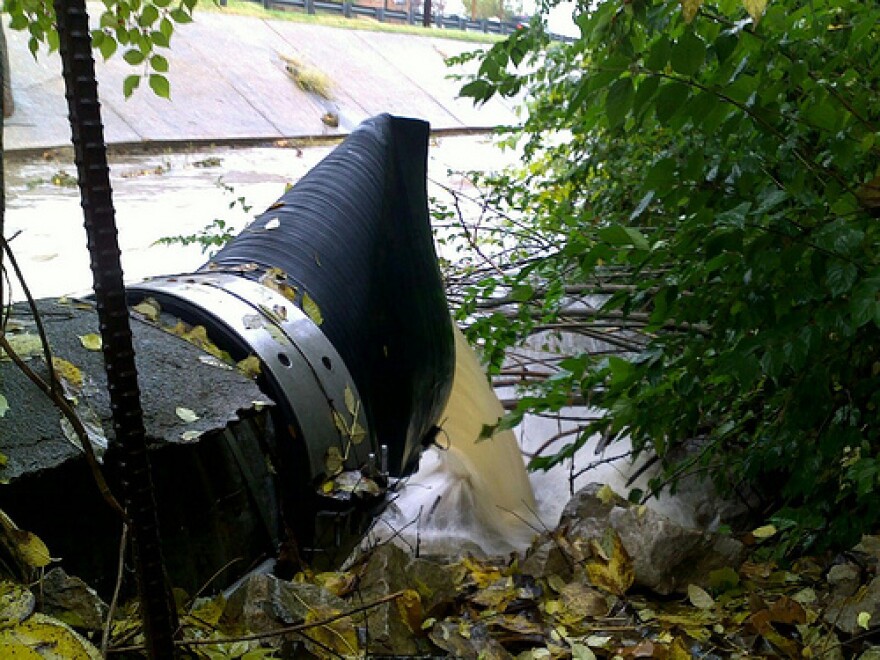A consent decreethat will settle a four-year-old lawsuit against the Metropolitan St. Louis Sewer District over violations of the Clean Water Act is a step closer to taking effect.
MSD, the federal Environmental Protection Agency, and the advocacy group Missouri Coalition for the Environment submitted the settlement to the U.S. District Court in St. Louis today. It will remain open for public comment for 30 days before taking final effect.
The lawsuit, filed in June 2007, alleged that MSD allowed untreated sewage to run into area creeks and rivers, either via illegal sewer bypasses or because storm water overflowed into sanitary sewers.
"River Des Peres. Maline Creek. Gravois Creek. These urban waters for too long have been sources of embarrassment and even misery," said EPA Region 7 administrator Karl Brooks. "With MSD's enterprise, these waters familiar to all of you St. Louisans will again form a blue necklace encircling St. Louis, this historic city."
The agency operates the fourth-largest sewer system in the United States, and the amount of infrastructure repairs MSD will make is the largest from a Clean Water Act settlement in history. Among other things, MSD will have to:
- Spend $4.7 billion over the next 23 years to remove those 200 illegal bypasses and make other repairs to keep storm and sanitary water separate. Fifty of the bypasses must be removed by the end of the year.
- Pay a $1.2 million civil penalty, due in 30 days. Instead of paying the attorneys fees of the Coalition, MSD will instead set side $116,000 to fund projects for theRiver Des Peres Coalition.
- Set aside $100 million for a green infrastructure program, and $1.6 million for a fund to help low-income residents repair their sewer lines.
"This is a settlement agreement that addresses long-standing problems that are felt certainly in the city and urban core. And to the extent that there are low-income and minority communities that will benefit from the work that's done, it's appropriate to take a look at how the consent decree can really address what are disproportionate burdens on these communities," said assistant U.S. attorney general Ignacia Moreno.
Green infrastructure has been a part of past Clean Water Act consent decrees, Moreno said, but the "nature, scope and extent" of the approaches that MSD will be using are historic.
Kathleen Logan Smith, the executive director of the Missouri Coalition for the Environment, said the green infrastructure is also financially necessary.
"There is not enough money in the region to solve these problems with gray infrastructure," Logan Smith said. "Nature does such a better job cheaper of cleaning and filtering and storing water than you and I can do it with all of our engineers and all of our concrete and all of our technology."
The settlement could cause monthly sewer rates to rise about 13 percent over the next four years, to $47.05. The agency's Rate Commission will begin aseries of public hearingson the proposed increase next week.
In a statement, MSD said the $2.3 billion it has spent over the last decade to eliminate about 300 sewer overflows shows there's never been any question about the need to upgrade the system.
Rather, the true question is how quickly this work is completed, which is the driver behind continued increases in monthly sewer bills. While $4.7 billion over 23 years is a very fair agreement when compared to the dozens of other cities across the nation that have been sued by the Federal Government, the fact remains that this is billions of dollars that will come from the pocketbook of St. Louis ratepayers – with little to no state or federal assistance – and will be unavailable for other critical needs in our community.
Though the state of Missouri was a party to the initial lawsuit, it did not sign off on the consent decree because of what the office of Attorney General Chris Koster has termed "ongoing issues." The attorney general has never specified what those issues are, and Moreno, the Justice Department official, would not comment on any confidential discussions.
- See the full statements from MSD, the EPAand the Department of Justiceon this case.





